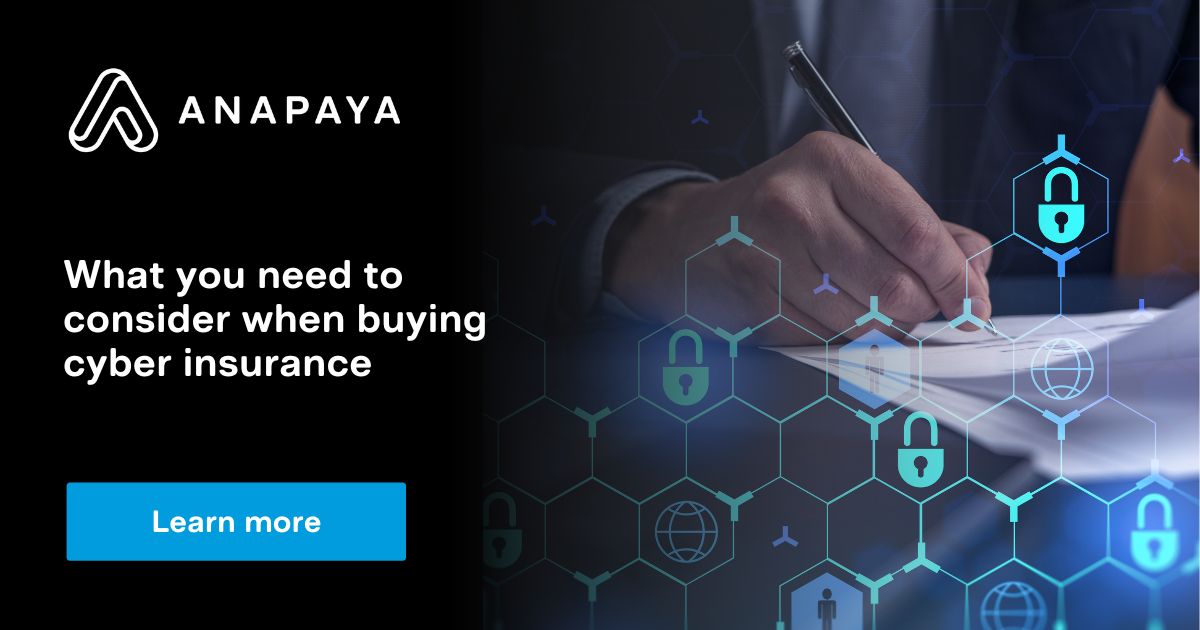Purchasing cyber insurance is one of the best measures you can take when it comes to securing the safety of your organization. However, it is not a substitute for a proper cyber defence strategy.
Just like you would never expect an insurer to pay out if you left your car unlocked with keys in the ignition, no cyber insurer is going to pay out – and they may not grant you a policy in the first place - if you don’t protect your data.
Cyber insurance may also cover intangible impacts such as reputational damage. For this reason, it’s best to have the very best technological protection in place, as well as cyber insurance in case the unexpected happens.
What is cyber insurance?
Cyber insurance exists for the same purpose as your home or car insurance: to provide you with protection in a worst-case scenario.
If a devastating cyberattack should occur, having cyber insurance in place will help mitigate the cost of an event that could otherwise severely damage your business’ financial position and potentially lead to bankruptcy.
Consumers expect businesses to handle their information responsibly, and regulators can impose heavy fines for breaches in data security. Cyber insurance can help you pay for those costs should an unexpected cyber attack occur.
However, having cyber insurance in place does not actually protect your data from being hacked in the first place. Your insurance policy may cover costs such as, but not limited to:
- Loss of income
- Forensic investigation services
- Security upgrades
- Legal fees
- Regulatory fines
- Compensation
Your cyber insurance will also be able to provide security experts who can advise you on what to do in a data breach emergency. However, in order to protect your organization’s data, you need the strongest protection available on the market.
Your organization’s risk level
In order to find the best cyber insurance for your business, you need to evaluate the level of risk you currently operate at to determine your cyber security needs.
For example, does your company actively collect or handle sensitive information like payment card information, personally identifiable information, or health and medical information? The more regulated and sensitive the data that you handle, the more at risk your organization is of a cyber attack because that data is more attractive to hackers.
What’s the current security health of your network? Are you following best practices in regard to encryption, data storage, retention and backup?
Cyber insurance and types of attacks
When you purchase a cyber insurance policy, you need to check it thoroughly to make sure it protects against all forms of cyberattacks you need.
Most cyber insurance policies will cover the costs associated with an attack in the form of ransomware, malware and other unwanted software. They will also cover DDoS attacks and BGP hijacks, but beware: they often do not cover what the insurers consider to be forgery, computer fraud, social engineering, ransom or funds-transfer fraud.
DDoS attacks can be incredibly damaging, and they are increasing in sophistication. It is important that the cyber insurance provider you choose is familiar with recent developments and will cover you for any eventualities. DDoS attacks have traditionally been about unleashing an overwhelming flood of traffic to incapacitate a network. Either hackers take down a network with brute force, or they use a DDoS strike as a distraction while attempting a more targeted attack, as was the case with Carphone Warehouse in 2015.
Now, however, cyber insurance firms have to adapt, as a recent report by Neustar reveals a significant increase in small-scale DDoS attacks with a corresponding reduction in large-scale events. It seems attackers are using smaller attacks to remain below the ‘detect and alert’ threshold that could trigger a standard DDoS mitigation strategy so that an attack can continue unnoticed while specific areas of the target network remain overwhelmed. The purpose of these stealthy, smaller DDoS attacks is to allow the attacker to enter and exit a network unnoticed or to allow the attack to continue undetected for longer.
As such, you should absolutely make sure that not only are your networks protected, but your cyber insurance is prepared to cover you for any damaging attack, big or small.
Consider your budget
As with purchasing any other product, you should always buy the best you can afford on the market. The cost of any cyber insurance policy is likely to be minuscule compared to the cost of navigating a cyber attack by yourself.
In fact, the global average cost per data breach amounted to 4.35 million U.S. dollars in 2022, an increase from 4.24 million U.S. dollars in the previous year. The cost of a cyber insurance policy can vary widely, according to what coverage you need as well as the size of your organization.
If you fall foul of an attack, your cyber insurance policy will provide you with a team of experienced experts to examine the source of the breach and stop it. They will also help you notify affected parties and cover the cost of fines and any defence required. These services alone would represent a significant cost if you did not have cyber insurance in place.
Insurance: Not enough on its own
Prevention is better than cure, especially when it comes to cyber insurance. Stopping a cyber attack before it happens is always infinitely preferable to mitigating the fallout.
Cyber insurance makes a brilliant safety net for organizations at risk of a data breach. It will help you pay for the associated costs, which almost always run high. However, cyber insurance is still a passive defence. You should consider it a necessary complement to the strongest cybersecurity program possible.
Anapaya’s SCiON technology lets you tailor your network security, allowing your organization to take a proactive and agile approach which optimizes your protection to suit your needs. You can select data paths based on speed, quality or security and control hidden paths to avoid hostile nations which may intercept sensitive data at times of global unrest.
In recent years, the world has witnessed first-hand how cyber security can quickly become compromised. Your organization is no less of a target than any other, regardless of its size or the data it handles.
SCiON can strengthen your defence systems, and that could significantly reduce your insurance risks. It is the newest solution available that allows no compromise to your data security and privacy on an individual, enterprise or national level. If you’re ready to find out more about SCiON, get in touch with us to arrange the best network security for you and those whose data you need to protect.
TAGS:
Cybersecurity




.png?width=380&name=Image%20(11).png)




